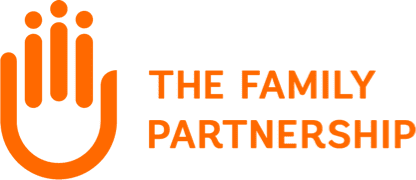Beginning July 1, early childhood programs across Minnesota can access EGG through grant-funded opportunities
Minneapolis, MN
The Family Partnership is excited to announce that EGG Toolkit is now an official Parent Aware Aligned Curriculum, marking a significant step forward for early childhood programs committed to equity and school readiness. With this designation, Parent Aware rated preschool programs statewide can access grant-funded support to implement EGG Toolkit—proven to build executive function skills in children ages 3 to 5.
EGG’s approval arrives just as Minnesota prepares to release updated Early Childhood Indicators of Progress (ECIPs) that emphasize trauma-informed practice and executive function development—areas where EGG leads with science-backed tools for classrooms, home visiting programs, and parenting groups.
“Parent Aware approval signals that EGG Toolkit is a trusted, high-quality curriculum that meets Minnesota’s benchmarks across several key developmental domains, including executive function,” said John Everett Till, Chief Strategy Officer at The Family Partnership and Co-Developer of EGG. “This designation means programs participating in Parent Aware can offer young children—especially those impacted by trauma or poverty—the chance to build core skills for resilience, focus, and lifelong success.”
Why Parent Aware Approval Matters for Early Childhood Programs
With EGG Toolkit now Parent Aware approved, early childhood programs can use grant funding to support adoption that covers costs for curriculum materials, professional development and quality improvement goals.
Because Parent Aware participation is tied to Minnesota’s Quality Rating and Improvement System, using an approved curriculum like EGG helps programs boost their star rating and stand out to families and staff seeking high-quality, evidence-based care and education. EGG training also counts toward in-service licensing requirements.
“EGG Toolkit has been a powerful addition to my classroom—not just for the kids, but for me as an educator,” said Colin, a preschool teacher at Four Directions who has used EGG in his classroom for the past three years. “It gives children the language and tools to manage big feelings, support each other, and build confidence in who they are. I see them practicing calming techniques on their own and encouraging each other in ways they never did before. EGG supports what matters most in early childhood: helping kids become kind, self-aware people who feel heard, respected, and ready to thrive—not just in school, but in life.”
EGG is the only Parent Aware Aligned Curriculum that focuses specifically on building executive function skills—critical for school readiness, behavior regulation, and resilience in the face of trauma. The curriculum’s alignment with Minnesota’s forthcoming Early Childhood Indicators of Progress (ECIPs), which now center executive function development as a response to the impact of trauma, positions EGG as a timely and forward-looking resource for early childhood educators statewide.
Proven Impact on Child’s Executive Function Development
EGG Toolkit is uniquely designed to build executive function skills—critical for children’s school readiness, behavior regulation, and lifelong success. These skills are especially important for children impacted by Adverse Childhood Experiences (ACEs), which can disrupt early brain development and create lasting barriers to learning and wellbeing.
Independent evaluations confirm EGG’s effectiveness among preschool-aged children:
- Children use their words: EGG significantly improves emotional language, behavior, and personal storytelling (University of Minnesota’s Center for Early Education and Development)
- Children tell their stories: EGG boosts narrative complexity in young learners (Salt Software)
- Children make healthy choices: Children who started below the median for executive function skills improved to above the national median (Reflection Sciences)
These gains support brain development during a once-in-a-lifetime window for building executive function skills—ages 3 to 5—while also nurturing joyful preschool classroom environments. Teachers report fewer behavioral disruptions, more engaged learners, and stronger overall outcomes. EGG’s flexible, easy-to-use format helps educators create joyful, responsive learning experiences that benefit every child.
The latest results from EGG’s 2024-25 Minnesota-funded pilot expansion will be available later this year.
About EGG Toolkit
Developed by The Family Partnership in collaboration with educators and brain science experts, EGG Toolkit builds executive function skills in 3- to 5-year-olds.
Adaptations are available for preschools, home visiting programs and parenting groups. Activities take just minutes per day and build skills for success in school and life:
- Internal State Language: Supporting emotional awareness and self-control
- Narrative: Boosting memory, problem-solving, and decision-making
- Mindfulness: Encouraging resilience and self-regulation
To learn more about EGG Toolkit and how it can support your program’s school readiness efforts, visit www.eggtoolkit.com.
####
About The Family Partnership
The Family Partnership is a 147-year-old Minneapolis nonprofit providing advocacy and services in early childhood education and care, mental health therapies, family home visiting and anti-sex trafficking. Our mission is to build strong families, vital communities and better futures for children. We use a 2Gen approach with the latest insights from brain science to remove barriers and clear the path to success for those who have experienced trauma and deep poverty.
####
Contact:
John Everett Till (he/him)
Chief Strategy Officer
The Family Partnership
JTill@thefamilypartnership.org
As a parent or caregiver, you do everything you can to support your child’s well-being. But even when you’re doing your absolute best, it’s easy to wonder: Am I doing enough to build the kind of relationship that truly supports my child’s mental health? The good news is that small, intentional moments of connection have a lasting impact—and therapists have practical, research-backed tips to help you strengthen that bond.
We spoke with therapists Dana Barnaal, Outpatient Mental Health, and Rosemary Frazel, School Linked Mental Health, from The Family Partnership about the importance of parent-child bonding and what caregivers can do to strengthen their relationships with their children.
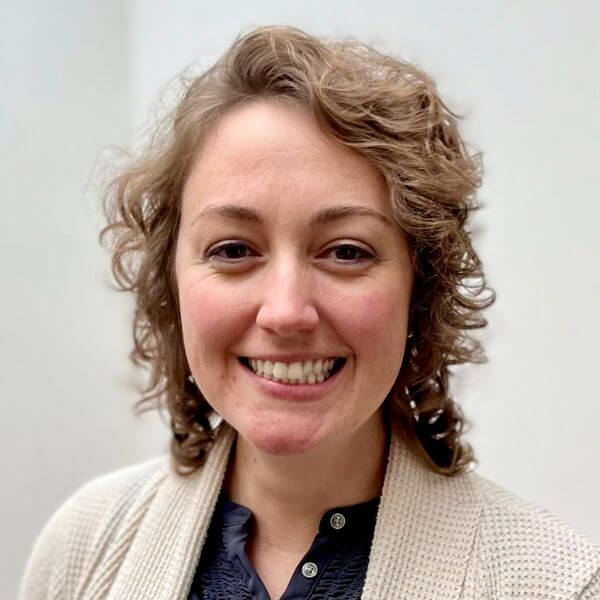

What Makes Parent-Child Relationships So Powerful?
The parent-child relationship lays the foundation of a child’s emotional, social, and cognitive development. When children feel connected to a trusted adult, they’re more likely to thrive.
Strong parent-child relationships help children:
- Build resilience against adversity
- Regulate emotions and behaviors
- Develop a secure sense of self and confidence
- Form healthy future relationships
As Rosemary explains, “Young children are deeply connected to their caregivers. That is why it’s important to focus on and strengthen that relationship.” Dana adds, “Children grow in the context of their relationships.”
10 Therapist-Recommended Tips to Strengthen the Parent-Child Relationship
Based on their expertise as therapists, Dana and Rosemary offer practical ways you can deepen your connection with your child.
1. Normalize Mistakes and Practice Repair
No parent is perfect—and that’s okay. Mistakes are a natural part of parenting. As Dana explains, “Mistakes are going to happen. The important piece is repair.”
For example, Rosemary suggests, “If you’ve made a mistake, apologize to your child. You’re teaching them that mistakes are part of life, and we can always try again.”
When you apologize after a moment of frustration, you show your child that relationships can be mended—and that they are loved, even when things don’t go perfectly.
2. Understand the Meaning Behind Your Child’s Behavior
“Children’s behavior has meaning,” says Rosemary. Slowing down to reflect on what’s underneath the behavior can help build empathy and connection. For example, you may become frustrated with a child who is clingy and having difficulty separating from you during preschool drop-off.
Your first reaction might be to feel embarrassed or frustrated—but if you pause to reflect, you might recognize that their big emotions are a sign of anxiety about separation or a change in routine.
Instead of sneaking out or rushing out the door, you might offer a reassuring hug and affirm, “It’s hard to say goodbye sometimes, but I’ll be back after snack time—just like always.” That calm and connected response helps your child feel safe—and it teaches them how to handle tough feelings over time.
3. Help Your Child Name and Manage Big Feelings
Dana says, “It is important to help children name hard feelings and reassure them that they can handle them.” That does not mean that the child has to handle them alone, however. Dana adds, “We want children to know that their caregiver is there to help them.”
Dana’s advice is in line with recommendations from Zero to Three: Emotions can be overwhelming for children and naming them normalizes them. Helping your child identify and name their emotions is also essential to a child’s social and emotional development.
For example, if your child sits down on the floor and yells “No!” when you ask them to clean up their toys, you can respond by saying, “You don’t want to clean up because you were having fun—it’s hard to stop when you’re not ready.” By calmly naming the feeling and showing you understand, you help your child feel heard while also guiding them toward emotional regulation.
4. Make Time for One-on-One Connection
Dana says, “You don’t need to have a whole day. Just a little time in the morning or evening.” She suggests that just a few focused minutes can make a big difference. This might be 15 minutes in the morning, 15 minutes after school, and 15 minutes in the evening.
You can read a book together, color, or even have them help match socks while you are folding laundry. Rosemary adds, “If you give your child some undivided attention, you will find that you can then back off and they’ll feel ready to play on their own.” This is because the child’s need for closeness and security has been met, and they feel confident in exploring their environment on their own.
5. Celebrate What Makes Your Child Unique
Kids develop a stronger sense of self when caregivers reflect back to them what makes them unique. “Instead of just saying ‘Good job,’ point out something specific,” says Rosemary. “Like, ‘You worked hard on that puzzle. You didn’t give up.’” This boosts a child’s confidence and self-awareness. Rosemary adds, “See your child, notice their capacity, and say it out loud.”
6. Let Your Child Make Choices
Find times when you can let your child have choice, control, and power in a situation. Oftentimes, parents and caregivers tell children what to do all day and that structure is important. However, even small choices help kids feel respected and build decision-making skills.
“Even something like choosing what color they want to wear or choosing between a couple items for dinner helps them feel empowered,” says Dana. This supports autonomy and builds confidence.
7. Reframe “No” as Growth
Rosemary suggests that parents and caregivers celebrate “No!” rather than seeing it as a power struggle. A child’s repeated use of the word is powerful because they are beginning to recognize themself as an individual and asserting themself. It is an important part of child development.
One way to do this would be to pause and take a couple of deep breaths to calm yourself. Then, you could reframe a command as a choice like, “Do you want to clean up by yourself or do you want us to clean up together?”
8. Support Unstructured Play
“Play is how children process the world,” says Dana. It’s also how they learn. Harvard Center on the Developing Child states that play supports executive function and social-emotional development. “Play is how young children learn and heal,” says Rosemary, “Play is a balm.” Also, play provides opportunities for connection between children and their parents and caregivers.
For example, when you are present in the room while your child plays, say aloud what you notice about their play. If the child invites you to join by giving you one of their dolls, for example, you could follow their lead.
9. Offer Reassurance During Tough Times
Children often blame themselves when conflict arises or something goes wrong. Rosemary urges parents to consider this and turn down the intensity of their reactions to when children act out. This might mean taking deep breaths to calm yourself or stepping away if it is safe to do so.
Also, during especially tough situations like divorce or stress at home, Rosemary suggests parents let their children know, “You didn’t do anything wrong. This is a grown-up problem.”
10. Take Care of Yourself, Too
“The biggest predictor of a child’s mental health is the mental health of their caregiver,” Dana says. Self-care isn’t selfish—it’s necessary.
Rosemary uses the Healthy Mind Platter to help parents and caregivers understand their needs and how to balance those with responsibilities. The Healthy Mind Platter offers several types of activities that support your mental health:
- Focus time
- Play time
- Connecting time
- Physical time
- Time in
- Downtime
- Sleep time
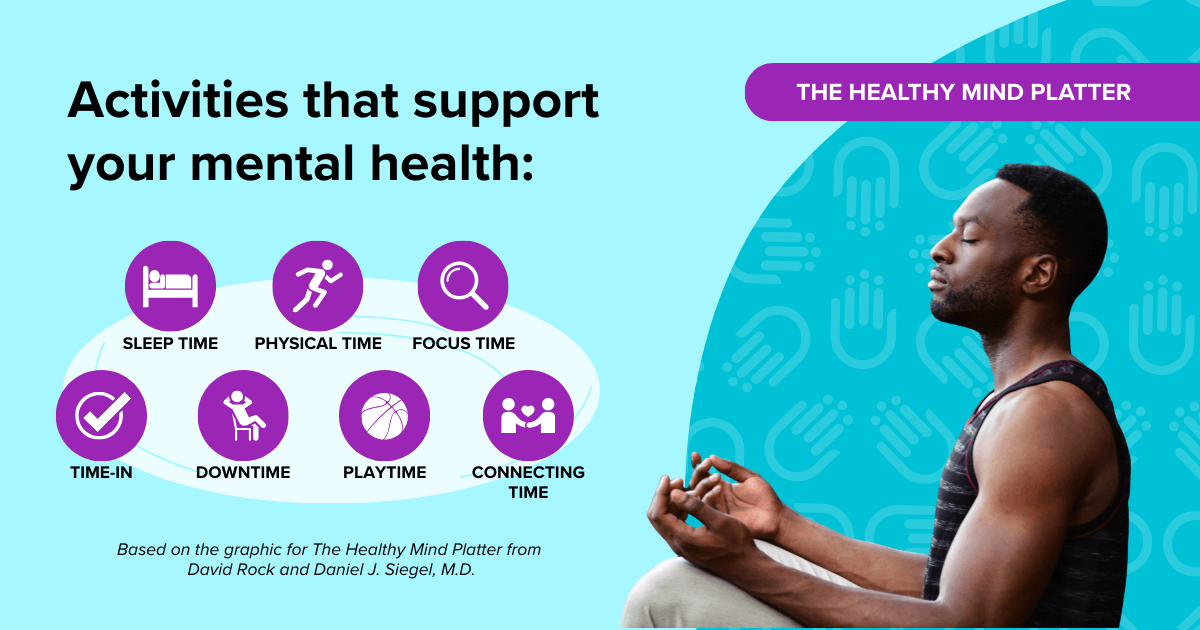
If don’t have time for these, try to change your schedule, set boundaries, and/or find support.
Both Dana and Rosemary emphasize the need for parents to seek support.
Some of those options might be:
- Find an Early Childhood Family Education program
- Reach out to a social worker at your child’s school
- Seek support through religious organizations
- Turn to trusted individuals and support people
- Search for local parenting groups and/or online communities
- Find a therapist at TFP or through Psychology Today’s directory
Rosemary also says, “If you’re parenting alone, show yourself a lot of grace and kindness.” Parenting is very difficult to do without support, so, connect with the supportive people in your life or find other sources of support.
A Two-Generation Approach to Family Healing
At The Family Partnership, therapists like Dana and Rosemary use a two-generation (2Gen) approach—helping parents and children heal together. If a child is struggling, often the best first step is offering support to the parent as well.
“When we give parents the tools to reflect and repair,” says Rosemary, “they create stronger bonds and more stability for their children.”
Want to help support Minneapolis parents and caregivers?
Consider a donation to The Family Partnership’s Rise and Shine Campaign. By midnight on 5/11, Mother’s Day, your gift will help provide essential support for mothers and other caregivers through The Family Partnership’s 2gen programs.
Sarah Williams joined The Family Partnership as the new Development Manager in March. We sat down with Sarah to talk about her experience, community engagement, and her priorities in the coming year.
Tell us a little about your background—what drew you to nonprofit work and eventually to The Family Partnership?
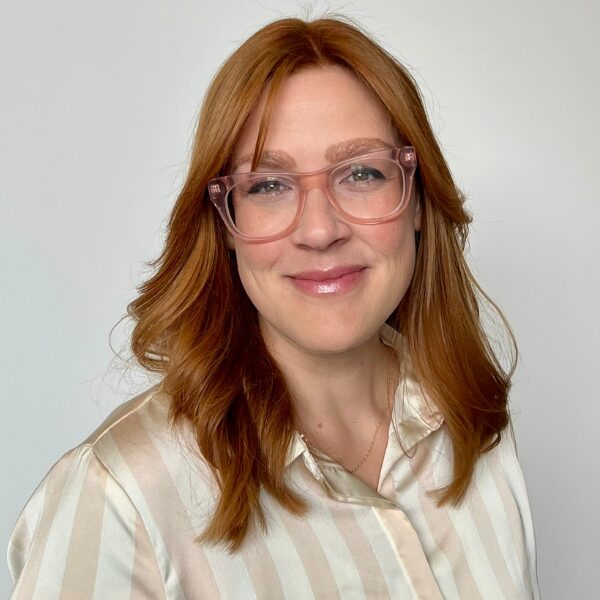
I have a background as a special education teacher, a legal advocate in child protection, and as a fundraiser for youth and family shelters. In all those roles, I have seen how systems that are meant to serve children and families often fail to meet their needs. The systems themselves are difficult to navigate and may cause additional harm to families already experiencing trauma caused by racial and economic inequity.
My experience as a legal advocate in child protection left a deep and lasting impression on me. I watched caregivers work tirelessly to meet the requirements of rigorous case plans with little resources or support. I wondered to myself, who is here to help the parents, as they work to meet the needs of their children? That’s why I’m so excited to work for The Family Partnership where caregivers can get that support through our Family Home Visiting programs and Mental Health Therapies.
In my time at People Serving People, I learned how early childhood education is a vital piece of housing stability for families. When families have quality childcare, caregivers can rest easy knowing that their child is safe while they are at work or pursuing an education. The income parents earn helps secure a safe and stable home for their children. Early childhood education is a once-in-a-lifetime opportunity to set children up for success far into the future. Four Directions, TFP’s multicultural and therapeutic preschool, provides screenings, checkups, and therapies to ensure that children are growing and thriving at this pivotal time in their lives.
How has your experience in communications and community engagement shaped your approach to development work?
My previous marketing experience showed me the importance of awareness and visibility in building a following. That experience shaped my approach to fundraising because I emphasize the “one to many” fundraising approach where you are speaking to a larger audience, whether that’s through digital communications, mailed correspondence, or in-person gatherings. You never know who might connect with your mission, so you share message broadly. Awareness is the first step in the journey. Once you get that first response, whether it’s a reaction to a social media post or an event invitation, you can deepen that relationship.
What are your top priorities in your first year as Development Manager?
I want to get to know the existing community that supports The Family Partnership. That means connecting to program staff, board members, and donors. Once I do that, I will strategize and work towards strengthening and expanding that community. TFP has a strong traditional fundraising approach that is based on philanthropic relationships. I am excited to learn about that while also doing broader outreach to possible new donors.
You’ve mentioned a focus on growing our donor base and engaging a new generation of donors. What is your vision for that work?
I truly believe in the power of the many. When we all come together, bringing whatever we have to offer, we’re unstoppable. Everyone has different gifts and talents. One person may give financial support; another may spread the word; another may volunteer their time. In terms of fundraising, I see how every single gift adds up. Every gift, of any size, contributes to the end goal and makes a difference. So, I’m excited to bring my marketing experience to help spread the word about TFP and to add to the already incredible base of TFP advocates.
Why is it important that our donor and volunteer communities reflect the families we serve?
When donors or volunteers can see themselves in the families we serve, they feel a stronger connection to our mission. All volunteer work and fundraising must center the dignity of families and that becomes easier and more natural when donors, volunteers, and families have shared lived experiences.
What role do events and community storytelling play in your development strategy?
In-person gatherings and storytelling are both important ways to build connection and a sense of shared humanity. Consequently, both are key to growing support for a mission. I believe in the power of strength-based storytelling to center the human experience behind our programs. I want to tell participant stories that evoke positive emotions and reactions, stories of their successes that supporters can connect to. Doing that during events is also powerful because those positive feelings are contagious.
If you’d like to learn how you can support TFP through a gift of time or money, you can find more information on ways to give here.
We’d like to introduce you to Robert Pickering, Chief Financial Officer, who joined The Family Partnership in March. We asked Robert to share his background and his thoughts on what he hopes to accomplish at The Family Partnership.
Tell us about your background and what brought you to The Family Partnership.
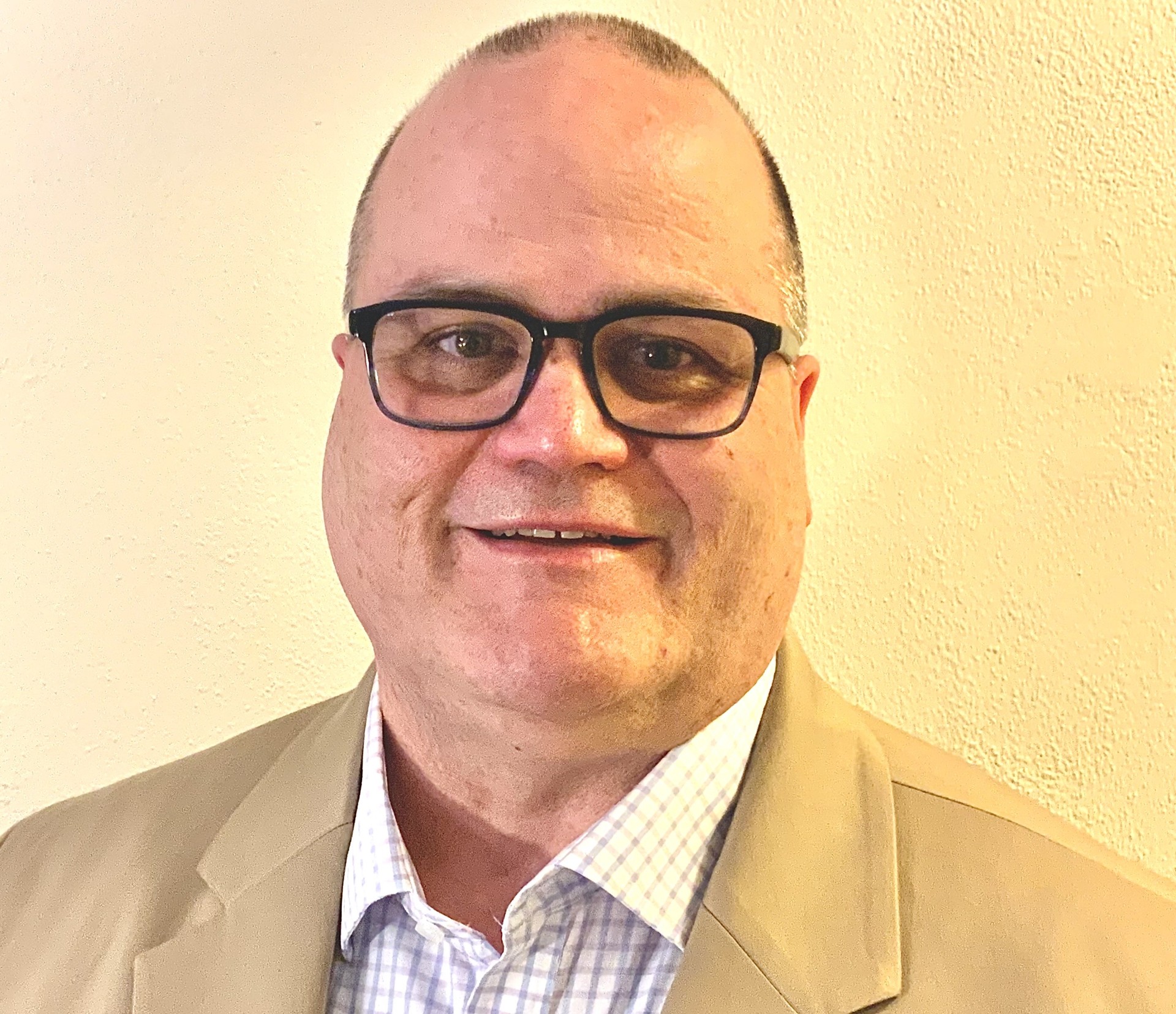
I have always been drawn to mission-based organizations and have worked in the nonprofit and social services sector my entire career. Most recently, I spent eight and a half years as the CFO at Accord, a nonprofit that supports people with disabilities, where I oversaw finance, IT, and facilities.
Prior to that, I was the Vice President of Finance and Administration at Lifetrack Resources, a Minnesota nonprofit that later became part of Lutheran Social Services. That’s actually where I first learned about The Family Partnership (TFP). Lifetrack also had a therapeutic preschool, and during that time, I had the chance to meet John Everett Till, TFP’s Chief Strategy Officer. He shared information about how best to create opportunities and positive outcomes for children in early childhood education programs.
Is there a personal experience or value that guides your approach to financial leadership in the nonprofit sector?
My path began with Community Action of Ramsey and Washington Counties in the early 1990s with the Head Start program. The Clinton Administration doubled the Head Start funding and I was charged with managing the budget, as well as finding classroom space and managing transportation, and food services.
Working with young children—many of whom were navigating difficult life circumstances—helped me see how early childhood programs like Head Start could offer equitable access to quality education. That sense of equity and fairness still guides my work today.
What excites you most about joining TFP at this moment in time?
The staff and leadership have been very welcoming. TFP has a rich history and strong reputation in the community, and I am looking forward to a new opportunity and challenge. We are creating systems and processes that will help the organization build financial resilience, make the best use of our resources, and help guide sound business decisions.
TFP is prioritizing financial stability in our bridge strategic framework. What would you say to funders, partners, and community members about the organization’s path forward?
We’re focused on being accountable and transparent with the resources entrusted to us. Our goal is to make smart decisions that maximize the impact of every dollar. I appreciate that TFP is located on Lake Street, rooted right in the heart of the community we serve. Our path forward includes continuing our community-centered programming. I also want to continue to figure out ways to support our early childhood programs.
Looking ahead, what are your top priorities for your first months/through the end of the year as CFO?
My primary focus is ensuring TFP remains financially sustainable to continue to serve the community for at least another 147 years. My goal is to help program managers meet their budget goals while creating the strongest impact they can.
Anything else to add?
I sit on the board of directors of Nonprofit Insurance Trust which provides liability and worker’s comp to nonprofit organizations. TFP is a member of that trust. I also sit on the finance committee for Emma North Services and on the executive committee for the Minnesota Multifaith Network.
I believe in and am committed to giving back to the community, both through my career and my volunteer work.
As we establish the financial foundation for our next chapter—we invite you to be part of it! Whether you’ve donated, volunteered, or just believe in our mission, your support clears the path for family success in Minneapolis. Sign up for our newsletter to stay informed and get involved.
Minnesota’s recent investments in early childhood have helped thousands of Minneapolis families living in or near poverty achieve significant milestones through The Family Partnership’s programs in 2024:
- 90% of children in our preschools graduated kindergarten-ready, nearly doubling the 52% rate of their peers
- 87% of children in developmental therapies met their treatment goals
Parents like Amanda Youlou have directly benefitted from these investments. She used and early learning scholarship to enroll her daughter, Lilah, at TFP’s top-rated Four Directions Preschool. Through play-based learning, healthy nutrition and nurturing care from her teachers, Lilah thrived. She also accessed onsite play-based therapy to help her cope with the death of her father.
“Lilah developed a love of learning at Four Directions,” shares Amanda. Today, Lilah is thriving in second grade, and Amanda credits The Family Partnership with helping her daughter build the confidence and emotional resilience she needed to succeed.
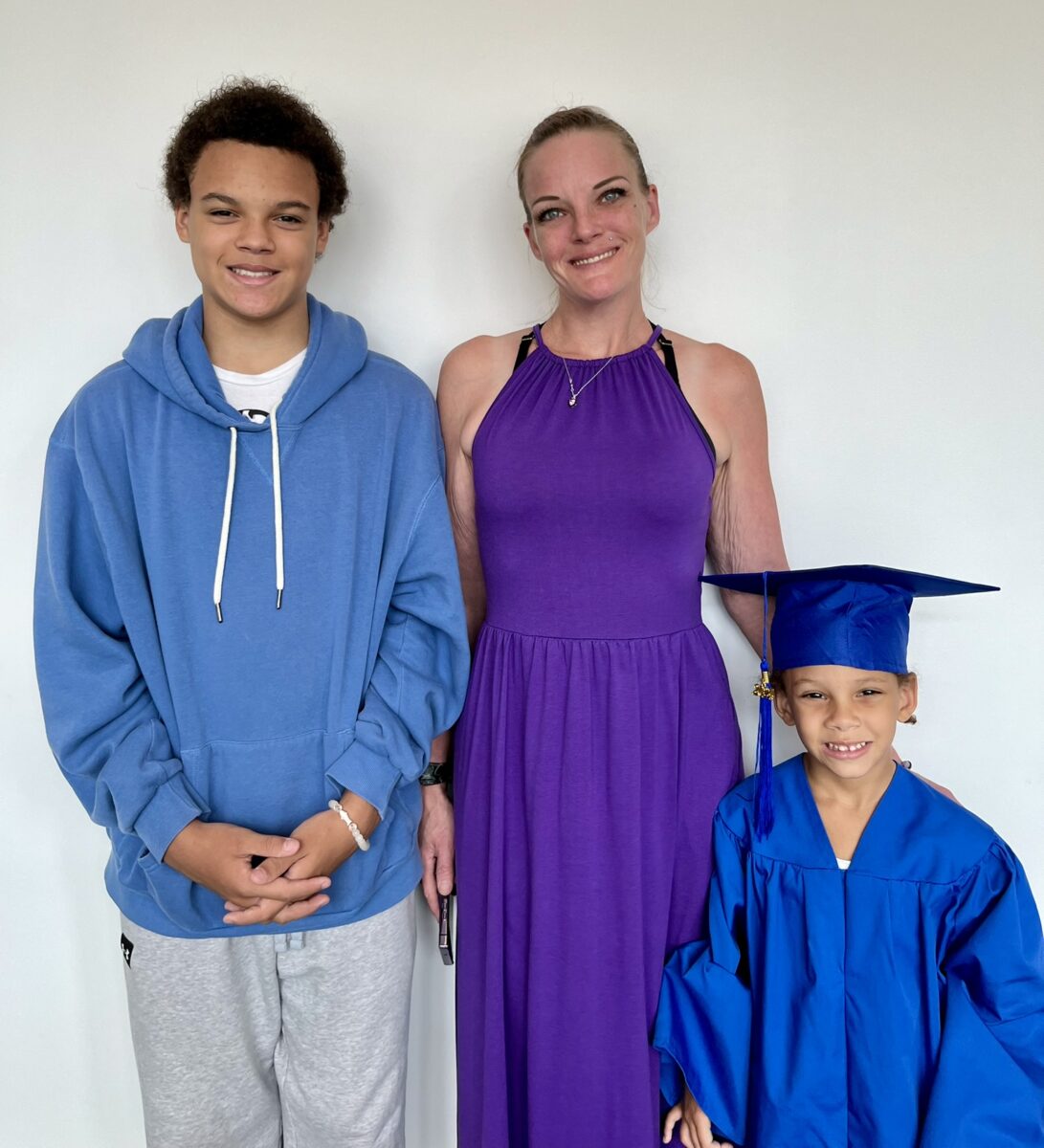
Research shows that children like Lilah who receive high-quality early childhood education experience positive outcomes in cognitive development. This is especially true for executive function skills that predict children’s academic achievements in K-12 education and, later, success in the workforce.
Early Childhood Investments in 2023 Fuel Minnesota’s Economy and Families, Highlighting the Need for Increased Funding in 2025
High-quality early childhood programs like Four Directions make it possible for parents and caregivers to participate fully in the workforce. “Without good childcare, you can’t get to work,” Amanda explained, “or you might have leave your kids with people you don’t know well.”
Without good childcare, you can’t get to work or you might have to leave your kids with people you don’t know well.
Amanda Youlou, parent
Workforce participation and affordable child care go hand in hand, especially for low-income families who otherwise spend an average of 36% of their income on child care. Studies show when child care costs are subsidized, parents and caregivers from low-income households are much likelier to remain employed, especially in full-time jobs.
In 2023 the Minnesota Legislature made historic investments in our state’s families and future by investing $1.3 billion over four years to early childhood education and care—one of the boldest commitments in the nation. These funds expanded access to high-quality child care and early learning programs, with key actions including:
- More funding to help families afford preschool and high-quality child care through Early Learning Scholarships (ELS)
- Expanded access to the Child Care Assistance Program (CCAP) that helps cover child care costs for more families
- Simplified application process to make it easier for families to qualify for financial support
- Increased payments to child care providers so they can keep offering quality care for families
While these steps made a difference, they do not fully address the needs of thousands of working families still struggling to find affordable, high-quality child care. Legislators from both sides of the aisle, including Rep. Nolan West (R-Blaine) and Rep. Carlie Kotyza-Witthuhn (DFL-Eden Prairie), are currently proposing legislation to expand Early Learning Scholarships to more families in need.
Child Care Shortages Cost Minnesota Families and the Economy Billions Each Year
It is important to sustain early childhood investments in 2025 including early learning scholarships. The demand for affordable, high-quality child care is rising as more workers return to the office. At the same time, every region in Minnesota is grappling with significant child care shortages that limit families’ options.
In 2024, first Children’s Finance estimated these shortages affected 89,528 Minnesotan children with working parents. Without better options, many parents stay home or reduce their work to part-time in order to care for their children. Some parents alternate working hours with their partners or other family members, missing out on important family bonding time.
The cost of insufficient child care in Minnesota affects families as well as businesses and taxpayers. Research shows these negative impacts total $2.1 billion in losses per year in Minnesota including:
- $19,610 average loss for parents in earnings and productivity each year
- $3,280 loss in revenue for businesses, per working parent
- $5,170 loss for taxpayers due to lower income tax and sales revenue, per working parent
These monetary losses have long-term consequences for children, especially those living in low-income households. Economic instability increases risks that children will experience hunger, homelessness or child maltreatment. In fact, poverty has the same harmful impacts as other Adverse Childhood Experiences (ACEs) like physical abuse or neglect. There are lifelong ramifications for children who grow up with toxic stress related to economic instability, including higher risks of depression, substance abuse and unemployment in adulthood.
Early childhood investments are some of the most strategic moves Minnesota can make for our short-term and long-term prosperity.
Early childhood investments are some of the most strategic moves Minnesota can make for our short-term and long-term prosperity. We’ll support this generation’s working parents while building a strong workforce for the next. These investments will continue to position Minnesota as one of the nation’s best places to raise a family and strengthen our economic growth.
Take Action: Advocate for Expanded Early Childhood Funding in 2025
Join The Family Partnership in raising awareness and support for early childhood investments. Here are just a few ways you can help:
- Join The Family Partnership this Thursday, 2/20/25 for Advocacy for Children Day at the capitol and make your voice heard
- Contact your legislators and encourage them to support funding (HF 470/SF 1049) for early childhood education.
- Sign up for our newsletter to stay informed about our advocacy efforts
The Family Partnership (TFP) is excited to welcome Julie Bluhm as our new Interim President & CEO. Julie brings expertise in guiding nonprofit organizations through transitions and aligning mission-driven work with sound business practices. Her leadership will guide TFP through the search for a permanent CEO and help us to continue building a strong foundation for the future.
Julie shared her enthusiasm and vision for her work with TFP:
“My goal during this interim period is to help connect the dots between The Family Partnership’s strengths and align this organization for the best outcomes. By the time TFP’s new leader arrives, we will be ready for the next chapter, and staff will feel rested, calm, fulfilled and excited about the future.”
My goal during this interim period is to help connect the dots between The Family Partnership’s strengths and align this organization for the best outcomes.
Julie Bluhm, Interim President & CEO
Introducing our Bridge Strategic Framework
In tandem with this leadership transition, TFP’s Board of Directors has adopted a Bridge Strategic Framework for 2025-2026. This forward-looking plan outlines five priority areas to guide TFP’s mission of building strong families, vital communities, and brighter futures for children.

Financial Sustainability
TFP is committed to ensuring its 146-year legacy of serving families and children experiencing intergenerational trauma, poverty, and adversity. Through flexible funding strategies, new revenue streams, innovative partnerships, and operational efficiencies, TFP will remain resilient and impactful amid an evolving financial landscape.
Organizational Health and Resilience
Recognizing the critical role of staff and board members in sustaining its mission, TFP will prioritize enhancing internal systems, supporting staff well-being, and strengthening board governance to navigate change with creativity and flexibility.
Intergenerational Impact through Services
Using a two-generation (2Gen) approach, TFP will continue to break cycles of poverty, adversity, and trauma by integrating services for both children and caregivers. Grounded in evidence-based practices, this approach addresses systemic racism and other barriers to create sustainable outcomes for families.
Thought and Practice Leadership
TFP remains committed to service delivery innovation and collaboration with local and national partners to drive improved outcomes for children and families.
Equity, Inclusion, and Anti-Racism
Dedicated to equity and inclusion, TFP will apply best practices in anti-racism within its operations and services while fostering leadership development across its staff and board.
Interim Leadership Builds a Strong Foundation for our Future
The Bridge Strategic Framework complements Julie Bluhm’s interim leadership by providing a clear and actionable roadmap for advancing TFP’s mission. Julie’s leadership philosophy is deeply rooted in helping organizations thrive during times of change:
“I’m really passionate about helping organizations connect their strengths and prepare for new leadership. If we do this well, we can ensure that the next leader’s skills, interests, and passions align perfectly with TFP’s needs.”
Julie’s prior experience includes serving as CEO of Guild Services, where she succeeded the organization’s founder. This experience gave her unique insights into the complexities of leadership transitions, inspiring her to help organize a support group for executive directors navigating similar journeys.
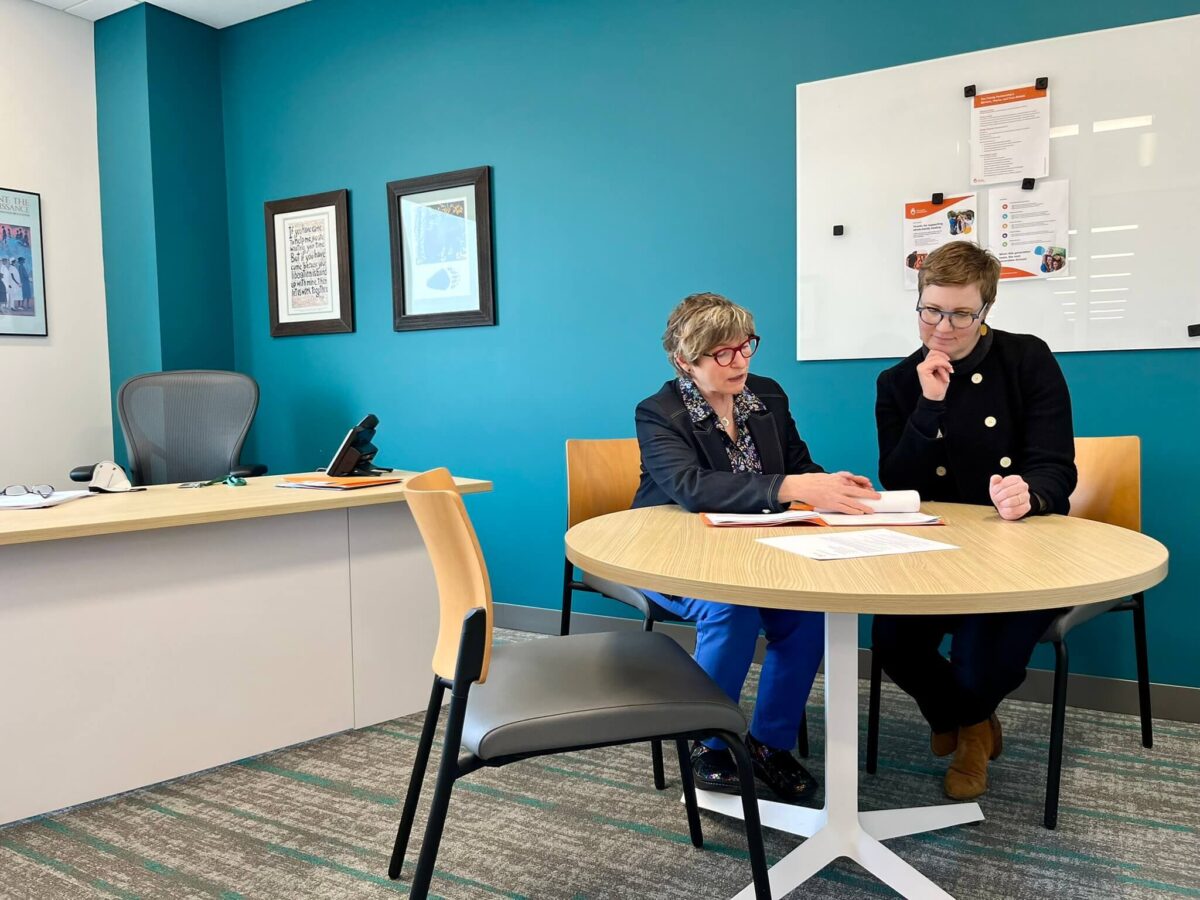
“The decision to hire Julie was made with great care and optimism for TFP’s future,” said Kit Briem, outgoing Interim President & CEO. “Julie’s leadership will provide the time and stability we need to thoughtfully select a permanent CEO who will steer TFP for years to come.”
As TFP searches for a permanent CEO, the organization is confident that Julie’s thoughtful, mission-driven approach—combined with the Bridge Strategic Framework—will position us for continued success in working to clear the path to success for children and families in Minneapolis.
As the new Vice President of Advancement at The Family Partnership, Ashley Hemnarine brings a wealth of experience and a deep commitment to our mission: building strong families, vital communities, and better futures for children. In this article, we’re excited to share Ashley’s story, her perspective on giving, and her vision for TFP’s generational healing work with individuals and families in Minneapolis.
From Letter Writing to Leadership: Ashley’s Journey to Advancement
Ashley’s journey to The Family Partnership (TFP) is rooted in her lifelong belief in the power of solidarity. Growing up in a diverse, under-resourced neighborhood in Newark, New Jersey, she became aware early on that not everyone had equal opportunities. She noticed disparities in healthcare, where families without insurance received lower-quality care at public hospitals. She also saw her mother facing discrimination; customer service representatives often berated her because of her accent.
Even as a child, Ashley showed concern for her community. In a letter to Santa, she requested, “I want everyone to be happy, world peace, and a Barbie.” She was fortunate to attend a well-resourced school and later enroll in college—experiences that helped her understand how different her life might have been without this access.
After earning her bachelor’s degree in psychology, Ashley went on to earn her master’s in health administration. While getting her master’s degree, she saw the ways in which healthcare systems perpetuate inequities and became disillusioned with the field. However, an internship at a hospital foundation helped her see the power of fundraising to meet the needs of organizations doing important work. Seeing how fundraising supports the missions of organizations that make real and concrete differences in people’s lives inspired Ashley to move into development.
After that experience and serving as a Development Associate for a nonprofit focused on strengthening health systems in sub-Saharan Africa, Ashley came to work at The Family Partnership in 2022, first as the Development Manager, then Development Director, and now as Vice President of Advancement.
Advancing Solidarity with Minneapolis families and communities
When Ashley joined TFP, the organization’s 2Gen approach and the emphasis on generational healing resonated with her. “A lot of people I grew up with had very different lives because of where they lived and the generational trauma they had to deal with,” Ashley reflects. This perspective drives her work at The Family Partnership (TFP), where she champions equitable access to resources for all families.
The Family Partnership works in Minneapolis communities that face racial and economic disparities, in a state with some of the worst racial opportunity gaps in early childhood in the nation. While just 50% of children living in low-income households are kindergarten-ready, 100% of the children in our preschools graduate with the skills needed to succeed in school and life. When it comes to potential and promise, there is no difference between children in our preschools and their peers. The difference is access to high-quality early childhood education and care at The Family Partnership, as well as two-generation programs that support the whole family.
For 146 years, The Family Partnership has adapted to meet the changing needs of Minneapolis families and communities. A critical part of our success involves meeting people where they are at. This core value applies to participants on their healing journey, staff who bring their authentic selves to work, and donors who find their passion in making a social impact.
How Donors Support Generational Healing through The Family Partnership
Ashley is motivated every day to raise awareness and support for The Family Partnership’s generational healing work. She loves working with TFP because the organization practices what it preaches—it’s the how and the why of TFP’s work that she feels confident sharing with donors so that work can continue. “The Family Partnership truly cares about the people we serve and how we serve them. We engage people to ensure we are providing the programs they want and need.” Donors make it possible for staff at TFP to innovate and meet the goals and needs of Minneapolis families.
Ashley pointed to the example of Sofia Silva Zapatta, an outpatient mental health therapist with TFP, who noticed how stressed-out mothers were when dropping their children off for play-based therapy. Based on The Family Partnership’s two-generation approach, Sofia understood the importance of supporting parents and the role that plays in children’s mental health outcomes. In response, Sofia created a somatic yoga program that helps parents and caregivers build skills for self-regulation and stress reduction.
The program also opened doors for Sofia to build relationships with caregivers, who then opened up about their struggles. By learning more about the families’ experiences and challenges, Sofia was better able to work with children and connect families to resources. One mother in the program told Sofia, “Even though my kids have access to health insurance, I don’t have health insurance or access to mental health treatment. I never thought that getting help for me was even possible. Somatic yoga is a safe space where we can process our emotions and learn how to deal with our stress. I’m no longer alone. I’m heard…I’m seen…and me and my kids are healing!”
Individual donations to The Family Partnership are unrestricted, allowing us to be flexible and responsive to the community’s most pressing needs across all our programs. If a person can’t pay their rent one month or needs groceries, these funds allow TFP to help—after all, no one can begin a journey of healing without having their basic needs met first.
Ashley shares a few examples of other ways that donors have helped Minneapolis families:
- Mothers who experienced sexual exploitation found safe emergency housing through our anti-sex trafficking services
- Children in our preschools received essential screenings including vision, dental, and child development—removing a barrier for parents and caregivers working multiple jobs
- 152 families and 515 individuals received gifts through the holiday sponsorship
Expanding the Idea of Giving at TFP—and Beyond
In her role as Vice President of Advancement, Ashley is working to expand the idea of giving at The Family Partnership and beyond.
She says, “My superpower is being able to translate the work that nonprofits are doing in a way that helps donors execute on their passion on social issues and causes.” When she meets with a potential donor, she enjoys finding out what excites them and what they are passionate about. She believes in helping connect donors to the organizations that share their passion, even if it isn’t The Family Partnership. She said, “One nonprofit can’t do everything, so, we need to help each other out.”
My superpower is being able to translate the work that nonprofits are doing in a way that helps donors execute on their passion on social issues and causes.
Ashley Hemnarine, Vice President of Advancement
One thing TFP’s donors have in common is an understanding of and commitment to a 2Gen approach to healing.
Ashley also wants to connect with younger donors as well as black and brown donors. A report from Indiana University Lilly Family School of Philanthropy shows that there is an underutilized market of black and brown donors who are looking for organizations that serve their communities and have leadership teams that reflect them.
A report from Donors of Color Network finds, “Donors of color are generous and insightful, and because of their lived experiences, they have the potential to be a driving force behind massive change in the field of philanthropy and for equity and justice movements. Donors of color bring critical insights, resources, and talent to bear at a socio-political moment in which new ideas, investment, and innovation are more important than ever.”
Ashley said, “As a young, brown Vice President, I know that I can bring a different perspective across race, age, and geography, to connect with donors.”
To do this, Ashley believes in helping potential donors understand the needs of the community and the impact smaller gifts can have. She also emphasizes that charitable giving is not just about what someone can give financially, but also what they can give in terms of their time and expertise.
- People can donate as little as $10 per month
- Host a gathering to assemble hygiene kits for one of TFP’s programs
Donors and volunteers are especially important post-COVID, since individual giving in the U.S. has declined for the first time since 2012. In 2023, 1 out of every 5 individual donors to The Family Partnership gave less than $100. Giving time is another way to make a big difference. Last year, more than 300 volunteers generously served children and families working with The Family Partnership.
“We are living in a time when anyone can give, not just the wealthy,” Ashley said, “Everyone can give in a way that is personal and meaningful.”
Looking for a way that you can make an impact? Visit our Ways to Give page to learn more.
Guided by our mission to build strong families, vital communities, and better futures for children, The Family Partnership is announcing strategic changes to sustain our 146-year legacy of service and advocacy with families in Minneapolis.
In 2025, we will consolidate all programs at our South Minneapolis headquarters. As part of this transition, we have made the difficult decision to close our North Minneapolis building, which currently houses multiple programs including our North Minneapolis Preschool. The final day of programming for North Minneapolis Preschool will be June 13, 2025. Families with children enrolled in the preschool have already been informed by TFP staff and provided with next steps. The other North Minneapolis programs will move to our South Minneapolis location but will continue to work with the clients they currently serve.
While change is not always easy, and these were tough decisions, we are confident that this will strengthen our overall financial sustainability and focus resources where they are most impactful. By uniting our team under one roof, The Family Partnership will strengthen our position to meet the evolving needs and goals of families today and into future generations.
Please read on for a Q&A regarding this upcoming transition.
Together with our community, we are building toward a future where every family has the opportunity to thrive.
Q: Why did TFP need to make these changes?
A: The Family Partnership’s realignment is a mission-driven response to factors affecting human services nonprofits across Minnesota and the U.S. since the onset of COVID-19. Rising inflation, wage pressures, and declining philanthropic support have made it necessary to take swift and strategic action to ensure our programs are sustainable and effective.
As other organizations are reducing or closing programs, we are as dedicated as ever to helping families overcome systemic barriers to healing and well-being. Selling our North Minneapolis building is a necessary shift to reduce overhead costs and focus more resources on direct services for families. The sale will strengthen our financial position, prepares us for the next chapter of long-term planning and allows us to continue our work to serve families.
Q: How will the building sale affect families?
A: The North Minneapolis building currently houses several programs, including Behavioral Health, Family Home Visiting, and Early Childhood Education and Care. We are working diligently to find solutions and build partnerships that will keep these vital services accessible.
Early Childhood Education: The most significant impact is the closure of North Minneapolis Preschool on June 13, 2025. This decision was not made lightly. Financial realities, including increased operational costs, make it necessary to consolidate resources and focus on maintaining services in a single, financially sustainable location. We are working to minimize disruption for families by exploring options for transition to other local, high-quality programs. Our priority is to help families find alternatives that continue to support their children’s growth and education.
Behavioral Health and Family Home Visiting: Northside families will continue to access mental health, developmental therapies, and family home visiting programs as always. We are working closely with local partners to explore leasing options that will allow families who currently access in-person services to retain that option. Families will also continue to have options of hybrid and virtual services. While our staff will be relocating to our South Minneapolis office, the following programs will continue without interruption:
- Mental health therapies
- Developmental therapies for outpatient participants, as well as through our partnerships with La Creche Early Childhood Centers and PICA/Head Start programs
- Family Home Visiting including Parenting for the Future, Healthy Families America, Promising Practices, Parent Support Outreach Program and Parent Capacity-Building Program
Q: What can the public do to support TFP during this time?
A: We invite our supporters, donors and partners to stay connected and engaged with The Family Partnership. We believe in the power of our community to show up and ensure that essential human services, particularly in early childhood education, mental health, family home visiting, and anti-sex trafficking, remain strong and accessible to those facing the greatest barriers.
One powerful way to support TFP is through advocacy for increased public funding for nonprofits, which are often under-resourced despite their crucial impact. Donations, as well as active community engagement, are also invaluable in helping sustain these vital services for Minneapolis families. We encourage everyone to lend their support where it’s most needed, whether that’s through TFP or another nonprofit close to your heart.
Q: Who can I contact with questions?
A: Please feel free to contact us at communication@thefamilypartnership.org.
Trinette Potts, EGG Project Manager at The Family Partnership, is leading the 2024-25 pilot expansion of EGG Toolkit into preschool and Early Childhood Family Education (ECFE) sites across Minnesota. With over 24 years of experience in early childhood education, Potts is excited to bring this innovative curriculum to classrooms statewide, helping 3- to 5-year-old children build the executive functioning skills they need to succeed.
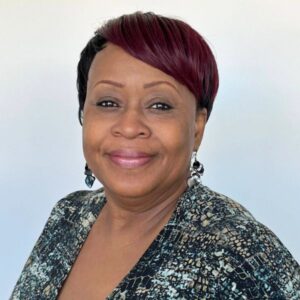
Trinette Potts, EGG Project Manager at The Family Partnership
“I’m passionate about this work because I’ve seen firsthand the impact EGG can have on kids and their teachers,” says Potts. “We’re dealing with a lot of dysregulation in classrooms, and this program provides the support both teachers and students need.”
Potts’ career began in direct care as the owner of a childcare business and grew into roles including director, business consultant, and professional development specialist. Her leadership in early childhood education is rooted in a deep understanding of the challenges teachers face daily. “We know teacher burnout is high right now,” she explains. “Many are leaving the field, and we want to give them tools to feel empowered in their classrooms.” Given her extensive experience in early childhood education, Potts is the perfect leader to oversee efforts to scale EGG Toolkit’s curriculum, training, and implementation in Minnesota.
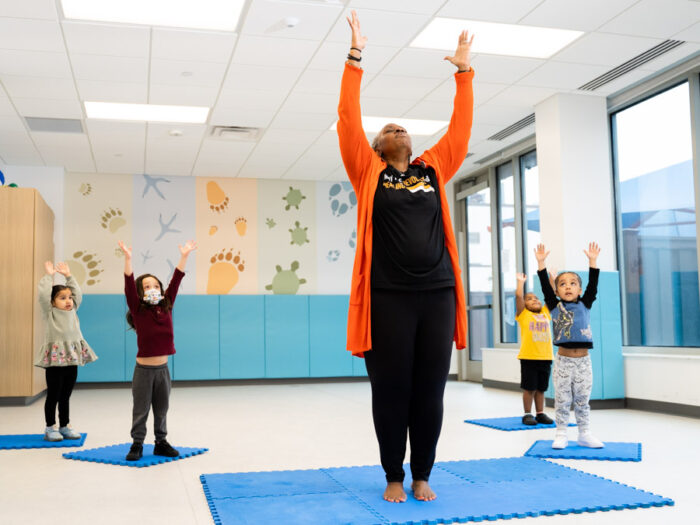
Mindfulness is one of the building blocks of executive functioning. Children use mindfulness skills to “re-set” and focus during stressful situations.
The history of hatching EGG
The Family Partnership designed EGG Toolkit (short for “Empowering Generational Greatness”) in 2017. The idea for EGG began when John Everett Till, Chief Operating Officer, learned that the earliest effects of childhood trauma manifest in the disruption of executive function development during the ages of 3 to 5 years.
According to Harvard Center for the Developing Child, “Executive function and self-regulation skills are the mental processes that enable us to plan, focus attention, remember instructions, and juggle multiple tasks successfully. The brain needs this skill set to filter distractions, prioritize tasks, set and achieve goals, and control impulses.” These early years are exactly the time when brain development is fastest and most foundational for building executive function and self-regulation skills and sets a foundation for children’s success in kindergarten and beyond.
John approached Christine Wing, CCC-SLP, PhD, about developing an early childhood intervention that could buffer children against the harmful effects of ACEs and boost kindergarten readiness. Together, John and Chris developed EGG in collaboration with early childhood educators and leading experts in brain science, child development, and curriculum design.
Today, EGG Toolkit is available in adaptations for preschools, home visiting programs and parenting groups. All variations focus on building executive function and self-regulation skills in children ages 3 to 5, with support from caregivers and educators. These skills are essential for academic success and overall well-being, as they help children manage their emotions, make healthy choices, and thrive in the classroom.
Developing an early childhood intervention for trauma
EGG is particularly effective in addressing challenges like Adverse Childhood Experiences (ACEs) by providing children with the language, storytelling, and mindfulness tools to navigate stress and trauma. These activities help foster a calmer, more focused learning environment, which in turn reduces behavioral disruptions and teacher burnout.
ACEs are traumatic events or experiences that occur in a child’s home or community. These can include abuse, neglect, and aspects of a child’s environment that impact their safety, stability, and sense of belonging. Family separation, racism, poverty, and community violence are also considered traumatic experiences.
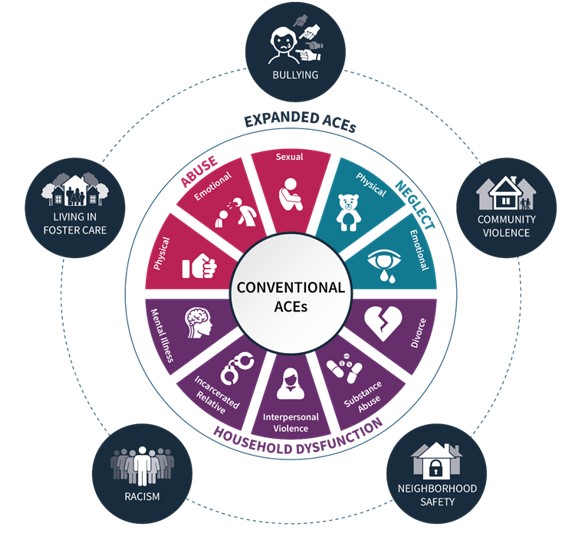
ACEs can include abuse, neglect and aspect’s of a child’s environment that impact their safety, stability, and sense of belonging. Graphic source: Minnesota Department of Health
ACEs are common. In fact, nearly one in two children (47%) in Minnesota report at least one ACE. However, research has shown that in Minnesota, American Indian and African American adults have three times the ACEs scores of their white peers. These early experiences of trauma and toxic stress impact a child’s developing brain and have lifelong consequences.
Research shows that the more ACEs a child experiences, the more likely they are to have negative outcomes in their lives including heart disease, diabetes, obesity, depression, substance abuse, and poor school performance. By building executive function and self-regulation skills, EGG Toolkit buffers against ACEs and supports healthier outcomes across a lifetime.
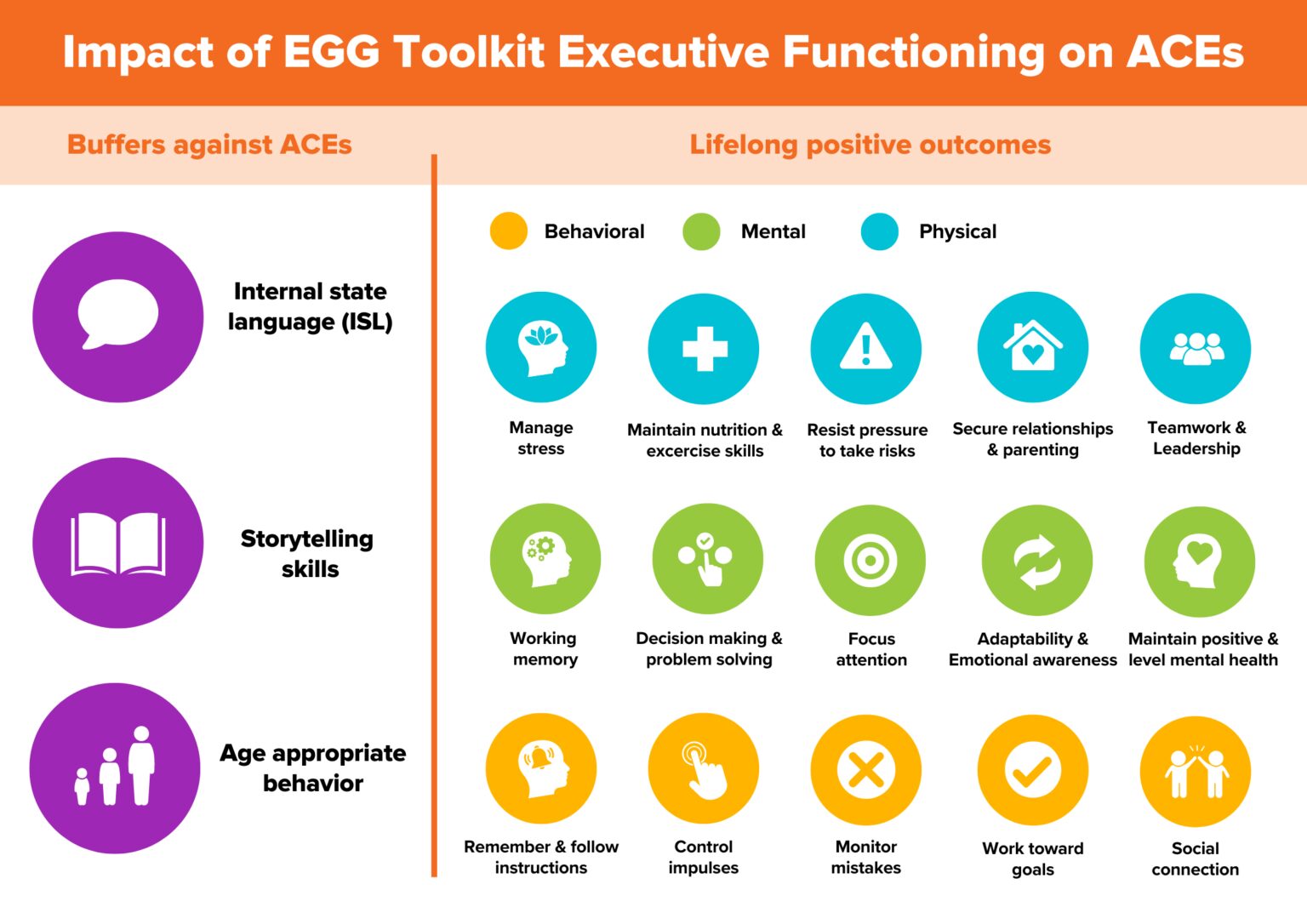
EGG helps to buffer children against the harmful impacts of ACEs, closing opportunity gaps in childhood and supporting a lifetime of better outcomes for physical, mental, and behavioral health. Graphic sourced from Center on the Developing Child – Harvard University
Creating a recipe for success in kindergarten—and beyond!
Opportunity gaps and disparities that result from inequity occur long before a child enters school. Early interventions like EGG help children develop essential skills for success in kindergarten, which predicts better outcomes throughout grade school and into their adult lives.
We’ve already seen amazing results from previous pilots. Kids who start below the national average in executive function are surpassing their peers after just a few sessions of EGG.
Trinette Potts, EGG Project Manager at The Family Partnership
“We’ve already seen amazing results from previous pilots,” Potts notes. “Kids who start below the national average in executive function are surpassing their peers after just a few sessions of EGG.”
EGG Toolkit addresses over half of preschool competency standards across multiple domains, supporting kindergarten readiness standards established by the state and assessments of a child’s total well-being and strengths. By building executive function and self-regulation skills, EGG helps children learn how to learn.
The benefits of EGG begin in the preschool classroom and they will continue as children grow up to become parents themselves. With greater capacities for resilience and focus, as well as language, storytelling, and mindfulness skills, parents can build more secure attachments. Their children also benefit from improved health, wellbeing, and prosperity.

Nurturing joy in preschool classrooms
The benefits of executive function and self-regulation skills begin in the preschool classroom, making EGG a critical support for educators in a challenging industry. Since COVID-19, Preschool administrators are seeing increased behavioral challenges and developmental delays that add to the stress of early childhood educators. According to a survey of early childhood educators in Minnesota by the National Association for the Education of Young Children (NAEYC) in the fall of 2022, 50.7% of respondents were experiencing staffing shortages. 74.7% of those surveyed were experiencing burnout and 35% were considering leaving the field.

“We know that right now in our field, there’s a lot of teacher burnout,” Potts said. “Teachers are leaving the field and there’s teacher turnover. We want teachers to be happy in the classroom.”
EGG Toolkit helps nurture joy in the classroom, because children have the skills they need to focus, plan, and regulate their emotions and behavior. As a result, they are better able to learn the material presented by their teachers and build positive relationships with their peers.
In just 30 minutes per day, evaluation from the University of Minnesota’s Center for Early Education and Development (CEED) showed that EGG Toolkit had positive impacts on age-appropriate classroom behavior. After using EGG, children increased age-appropriate classroom behavior by 7.4 points—a statistically significant change with a large effect size.
Preschool teachers reported that EGG also had a positive effect on their classrooms’ atmosphere. “I saw positive growth into putting names into emotions,” one teacher from San Antonio shared. “They don’t act out. They explain why they need space and are in tune with their feelings.”
By building focus and resilience, EGG supports positive learning environments for learners and educators.
We know that right now in our field, there’s a lot of teacher burnout. Teachers are leaving the field and there’s teacher turn over. We want teachers to be happy in the classroom.
Trinette Potts, EGG Project Manager at The Family Partnership
Promising results show the benefits of EGG Toolkit
Evaluation of our pilot programs shows that EGG Toolkit increases executive function skills, and these results are especially significant for children who have experienced household or systemic trauma. We have several years’ worth of data and outcomes, but these are some of the highlights from our research partners:
- The Center for Early Education and Development at the University of Minnesota found that EGG demonstrated a significant impact on emotional descriptive language, positive age-appropriate behavior, and personal narration—all highly correlated with executive function skills.
- Language sample analysis by Salt Software determined the complexity of children’s narratives increased after using the EGG toolkit.
- Results from the Minnesota Executive Functioning Scale app from Reflection Sciences showed that children who started below the age-adjusted median for executive function scored above the age-adjusted national median after using EGG.
Empowering Generational Greatness across Minnesota
Training for staff at our 2024-25 pilot sites has already begun. Preschools are expected to begin implementation this fall, and ECFE programs are slated for spring 2025. Based on our success in previous pilots, Potts is eager to see EGG reach more communities, knowing it has the potential to change the lives of children, families and educators.
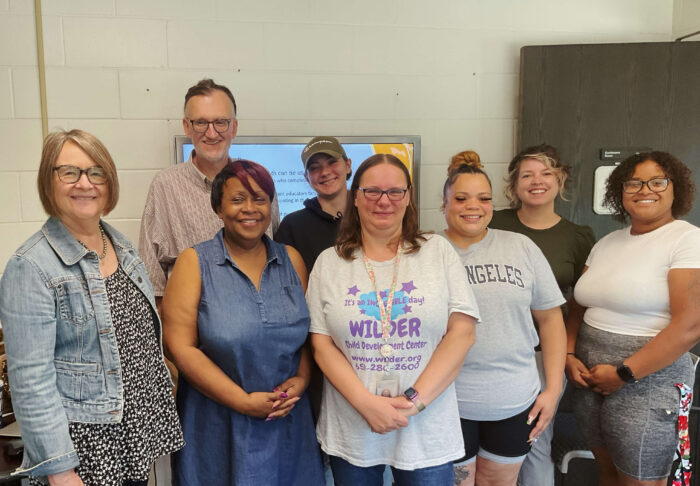
Trinette Potts, John Till and Chris Wing pause with staff from the Wilder Child Development Center during training in August 2024.
“This isn’t just about improving classroom behavior. EGG builds lifelong skills,” she says. “We’re also involving parents and caregivers in the process, so the benefits extend beyond the classroom.” According to Trinette, the importance of executive functioning is not known by many early childhood professionals, which is why she is so passionate about providing training to educators and staff. Participants in EGG Toolkit’s training will also receive credit that counts towards their development records and licensing requirements.
Potts said her favorite part of the training so far is witnessing the excitement of teachers. She said, “I love seeing the lightbulb moment for teachers. They get excited about the tools and how they can use them in their classrooms.”
One word that Potts uses often when discussing EGG Toolkit is “intentional.” The toolkit provides activities that help teachers, parents, and caregivers be more intentional in their interactions with children and that is why it works. For parents and caregivers participating in ECFE pilots, EGG Toolkit offers a 2Gen approach that builds awareness of executive functioning and skills the whole family can use.
Giving children and families the tools for executive functioning and self-regulation means giving them the skills to navigate the world. That changes the trajectories of families’ lives.
Trinette Potts, EGG Project Manager at The Family Partnership
By engaging parents and caregivers in the process, EGG Toolkit serves to strengthen bonds between family members—supporting a secure, loving environment for learning and growth. This is especially important for parents and caregivers who have ACEs themselves. Trinette said, “Giving children and families the tools for executive functioning and self-regulation means giving them the skills to navigate the world. That changes the trajectories of families’ lives.”
Visit www.eggtoolkit.com to sign up for our newsletter and learn more about how EGG builds lifelong focus and resilience in children 3-5 years old—and the adults who support their success!
